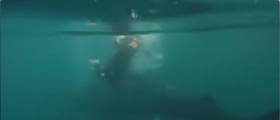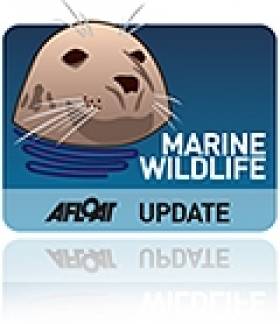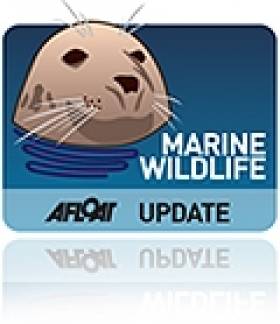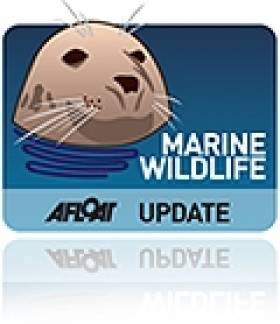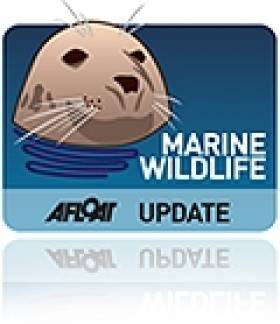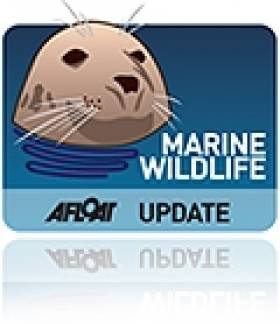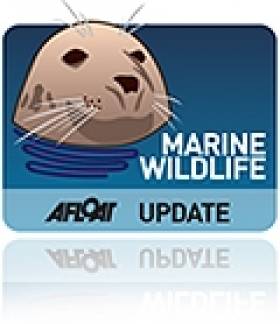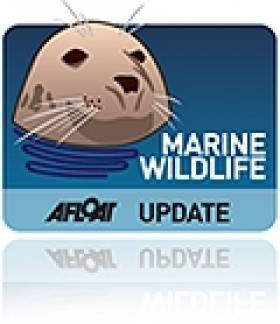Displaying items by tag: basking shark
RS Dinghy Sailors Swim With Sharks in Cork Harbour
Cork RS dinghy sailors Alex Barry, Sandy Rimmington and Andrew Welland shot some great video swimming off Roches Point, Cork Harbour up close and personal with some massive basking sharks. The footage (below) shows the plankton–only eating creatures feeding while the sailors swim around them. In a weekend of marine wildlife spottings there was sightings of breeching humpback whales off the Cork and Kerry coasts too.
Basking Shark Arrives in Cork Harbour For Harbourfest16
Port of Cork posted this picture of the 'biggest' basking shark in Cork Harbour today, presumably enjoying #corkharbourfest16 that includes the Ocean to City race.
Surprise Basking Shark Features In Cape Clear Documentary
#MarineWildlife - Do you remember the basking shark that surprised a group of bathers off Cape Clear last summer?
According to TheJournal.ie, it's now featured in a documentary shot on the fly by a team of quick-thinking filmmakers.
Aonrú, a film funded by Cork County Council and Bord Iascaigh Mhara, tackles the delicate subject of the West Cork island's future after the decline of the regional fishing industry.
But in the process of filming, they happened to be close by when the basking shark - the second-largest fish in the oceans – made its appearance, the solitary beast almost a metaphor for the island's dwindling community.
TheJournal.ie has more on the story HERE.
Video Shows Kayaker's Close Encounter With Basking Shark
#MarineWildlife - An angling kayaker has spoken of his surprise at being "stalked" by a basking shark off Donegal.
The Irish Times yesterday posted video of the close encounter captured by Graham Smith while paddling along the coast.
As Smith told the Irish Independent, he was only hoping to catch a tope shark when he came upon a school of basking sharks off the Inishowen Peninsula.
And when one of them started following him, Smith went into panic mode - but soon realised the shark was more interested in the slipstream of his kayak, which provided a steady source of plankton for the giant filter feeder.
The second biggest fish in the sea after the whale shark, basking sharks are now a regular sight in Irish waters, with protections on the endangered species resulting in a boom in numbers.
Basking Shark Carcass Beached On Dollymount Strand
#MarineWildlife - The carcass of a large basking shark has washed up and is decomposing on Dollymount Strand in North Dublin, as The Irish Times reports.
The gentle giant - one of the second largest species of fish in the world's oceans - was beached early yesterday (15 July) after being sighted floating in the River Liffey.
Dublin City Council said it was making plans to remove the carcass from the popular seaside spot on Bull Island.
Basking Shark Tracked from Donegal to Tropical Waters in Exciting Discovery
#shark – The journey of a basking shark has been tracked from Malin head, Co. Donegal to tropical waters west of the Cape Verde Islands, over 5000km. This is an exciting new
finding for the iconic shark species which visit Irish waters during the summer months. It was previously believed that the sharks that visit our shores only foraged in temperate waters.
'Banba' a female basking shark tagged in July with a satellite transmitter off Malin head, Co. Donegal has just released its transmitter west of the Cape Verde Islands, over 5000km away from were it was originally tagged. The five meter long female shark was one of five basking sharks tagged as part of the Monster Munch Basking Shark Community Awareness Project run by the Irish Basking Shark Study Group in association with the Inishowen Development Partnership and Queens University Belfast.
The movement by the shark 'Banba' into warm tropical waters off West Africa coupled with similar findings by leading American shark biologist Greg Skomal in the western Atlantic, questions the validity of the established theory that basking sharks inhabit temperate waters only. Previous basking shark tracking studies undertaken in the north east Atlantic have only recorded shark movements within temperate waters. The majority of tracked sharks have displayed a seasonal onshore - offshore migratory pattern, with movements of one or two hundred miles offshore onto the continental shelf edge during winter and return shifts to coastal waters during summer months. This seasonal pattern allows the sharks to feed year round on copepods a type of zooplankton, their stable food source. However the recording of this magnificent journey by a basking shark from Malin head to warmer tropical waters questions many of the fundamental theories marine biologists have regarding the species and its lifecycle.
Basking sharks were once hunted off the coasts of Ireland, but they are now classed as endangered in the North Atlantic. The Irish Basking Shark Study Group have been pioneering research on the iconic marine leviathan which can weigh more than an African elephant and grow to over 11m in length. In recent years the group have had internationally significant findings in DNA sampling, population surveys, tagging and tracking. The groups' motivation is to see the shark protected in Irish waters, one of the last western European territorial water bodies where they remain unprotected. Emmett Johnston a co-founder of the group spoke briefly about Banba's journey "The group are delighted with the finding, but it is a bit premature to be rushing out to change the shark biology books. We are awaiting the pop-off of the remaining three satellite transmitters attached this summer, recovering five complete basking shark tracks will allow us to compare the data and make informed conclusions. Until then there is not much we can say other than this is a highly unusual place to find a species that is presumed to inhabit temperate waters". The satellite transmitter tags used to track the basking sharks incorporate pioneering Fastloc GPS technology coupled with depth and water temperature sensors which will allow researchers to recreate the track of the shark in three dimensions.
Emmett added," Understanding where the sharks are and what they do when they are there, is essential to making informed management decisions regarding this endangered species". A number of years ago Dr. Simon Berrow a co-founder of the group noticed a parasite on the sharks called pannella when undertaking shark tagging off Malin head, this parasite is often recorded on cetaceans which have travelled through tropical waters so the group have had an inkling that basking sharks visiting Irish shores might have travelled through warmer waters prior to arriving on our coast. However in marine biology circles its one thing to propose theories and another to actually prove them.
The Monster Munch project was set up to bridge the gap between marine scientists undertaking research and the local communities in which the work is undertaken. The Inishowen Development Partnership, Queens University Belfast and the Irish basking shark study group funded the initiative which delivered a primary school based awareness programme encouraging local fishing dependent communities on the Inishowen peninsula in Co. Donegal to take ownership of the basking shark species and assist in its conservation.
Malin head on the Inishowen peninsula where the shark 'Banba' was originally tagged and named by pupils at Scoil Naomh Mhuire has recently been recognised as one of the world's top summer hotspots for the basking shark. Banba's magnificent journey to the Cape Verdes from the waters off Malin head is a valuable piece in the elusive jigsaw of the lifecycle of the sharks. This new finding by may prove to be a significant insight into the underwater world of one of the most endangered and iconic sharks in the Atlantic Ocean. For more information and to see a magnificent video of the shark log on www.baskingshark.ie
Basking Sharks Top Recent Marine Sightings
Basking sharks have dominated recent sightings of large marine wildlife, according to the Irish Whale and Dolphin Group (IWDG).
The largest shark species in Irish waters accounted for a whopping 43% of sightings submitted to the IWDG's ISCOPE database between 22 April and 1 May.
Other marine species spotted include minke whales (14%), bottlenose dolphins (10%) and sperm whales (2.5%).
April's unseasonably warm weather and calmer seas brought more people out to the water, which may account for this rise in figures.
Ireland's Wildlife has more on the story HERE.
Video of Basking Shark Tagging
Cork-based boat charter firm Whale of a Time has posted video on its YouTube channel of the Irish Whale and Dolphin Group (IWDG) tagging a basking shark from its boat Mischief:
Apart from whales, basking sharks are the largest species of marine wildlife to frequent Irish waters.
Basking Sharks Pay Early Visit to Ireland's Waters
The recent warm weather has attracted scores of basking sharks to feed in Irish waters weeks ahead of schedule, Metro reports.
Video posted on YouTube by mackerel fishermen in Donegal Bay shows one of the sharks - the second largest species in the big fish family - just metres from their boat:
"We saw about 20 basking sharks that day," fisherman Brian Smith told Metro. "I have never seen so many at this time of year. You don't usually see them until later in May time."
Despite their fearsome size, basking sharks are among the friendlies of Ireland's marine wildlife.
They feed only on plankton and tiny fish - sifting them through their enormous gaping jaws - and are known for their calm temperament.


























